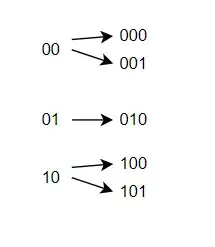For this problem, I used a proof by induction. My base case was essentially defining $b_1 = 2$, $b_2 = 3$, and then proceeding to the inductive step.
In the inductive step, I use strong induction. I assume the claim holds for $n=1,2,...i-1$ and show it holds for $i$.
We have by the inductive hypothesis $b_{i-1}$ is the number of $i-1$ length binary strings with no consecutive $1's$. To each of these such strings, we can add $0$ to generate $i$ length binary strings with no consecutive $1's$. We now have $b_{i-1}$ binary strings that end with $0$ and have no consecutive $1's$.
We have by the inductive hypothesis $b_{i-2}$ is the number of $i-2$ length binary strings with no consecutive $1's$. To each of these such strings, we can add $01$. These new strings are distinct from the strings we created above, as these strings end with a $1$, but the above strings end with a $0$. So, we have $b_{i-2}$ binary strings that end with $1$ and have no consecutive $1's$.
We note a binary string $B$ can be classified as such:
Ends with a 0: Last two digits are 10, 00. Case 1 considers all these strings
Ends with a 1: Last two digits are 01, 11. Case 2 considers all strings of the former case. The latter case is a violation, and each case ignores it.
Thus, $b_i = b_{i-1} + b_{i-2}$.
My problem here is:
1) Is my argument classifying the strings and then showing we counted correctly sufficient?
2) Is the proof by induction correctly formatted? I notice I am not using the fact $b_{i-1} = b_{i-2} + b_{i-3}$, but I do not know how to derive the conclusion without working on the assumption that $b_{i-1},b_{i-2}$ are indeed the correct number of binary strings without consecutive $1's$. It seems I am using induction right now to work under the assumption that the claim holds for all values $<i$, but could I not use induction and still work under this same assumption?
